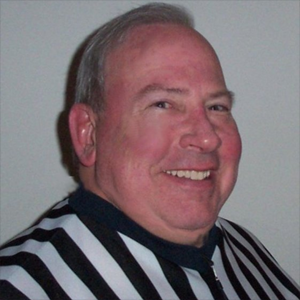
Rndballref
20 Years Experience
Chicago, IL
Male, 60
For twenty years I officiated high school, AAU and park district basketball games, retiring recently. For a few officiating is the focus of their occupation, while for most working as an umpire or basketball referee is an avocation. I started ref'ing to earn beer money during college, but it became a great way to stay connected to the best sports game in the universe. As a spinoff, I wrote a sports-thriller novel loosely based on my referee experiences titled, Advantage Disadvantage
I certainly encourage you to report this. Most people officiate because they love the game, and if you love the game you have a duty to do anything in your power to advance the avocation of refereeing. I suggest you find out who ran the AAU tournament and voice your concerns. Because of your background, meaning you have training and experience and do not appear to be simply a biased, ticked off untrained parent, the AAU tournament director should be willing to tell you who the assigner of the officials was for the tournament and you should contact him/her directly.
I think most states would not allow an official complaint at the state licensing level because AAU tournaments are not normally state sanctioned contests even though they only hire "patched state officials".
It is not a rule, but rather it is a mechanic perscribed in the NFHS Handbook. It used to be that the trailing referee would hand the ball to the free throw shooter for the first attempt and the lead (on the endline) would administer the rest of the free throws. Maybe ten years ago, it was changed so that the proper mechanic is for the lead official administer all free throws from the baseline. Most referees cannot advance if they do not follow the perscribed mechanics. Most importantly, mechanics set a consistent way of working a game, so that you can easily work with people you have never been assigned with, and secondly, following perscribed mechanics sets a professional expectation for coaches and assignment chairpersons to evaluate (in addition to judgement, hustle, and rules knowledge).
Yes you can in NFHS rules as long as the shot was a legitimate try. If the referee deemed it not to be a legitimate shot it should be called traveling.
No, the points should not be cancelled because the free throw ended "when it is certain the try was unsuccessful". The points were scored after the free throw ended, but before the error was recognized. When you are able to correct an error, "points scored, consumed time and additional activity, which shall occur prior to the recognition of an error shall not be nullified.
Antiques Dealer
 Does a piece's value increase significantly if it has a cool "back-story" to go along with it?
Does a piece's value increase significantly if it has a cool "back-story" to go along with it?
Business Start-Up Specialist
 Should friends go into business together?
Should friends go into business together?
Casino Dealer
 Do you find casinos to be depressing places to work?
Do you find casinos to be depressing places to work?
The referee (as opposed to the other officials) has the responsibility to decide matters upon which the timer and scorekeeper disagree. Furthermore, "the referee shall make decisions on any points not specifically covered in the rulebook."
There is no explicit provision in the rule book to address the situation you describe. So, the referee has to decide what would be consistent with the intent of the rulebook.
Actually, a dribble ends when you put two hands on the ball. But even if you have not dribbled already, putting two hands on the ball on the floor is normally called double dribble.
If team A loses possession because B tips the ball, but A does not reclaim possession (going thru fingertips does not establish possession) there would be no backcourt violation.
-OR-
 Login with Facebook
Login with Facebook (max 20 characters - letters, numbers, and underscores only. Note that your username is private, and you have the option to choose an alias when asking questions or hosting a Q&A.)
(A valid e-mail address is required. Your e-mail will not be shared with anyone.)
(min 5 characters)
By checking this box, you acknowledge that you have read and agree to Jobstr.com’s Terms and Privacy Policy.
-OR-
 Register with Facebook
Register with Facebook(Don't worry: you'll be able to choose an alias when asking questions or hosting a Q&A.)